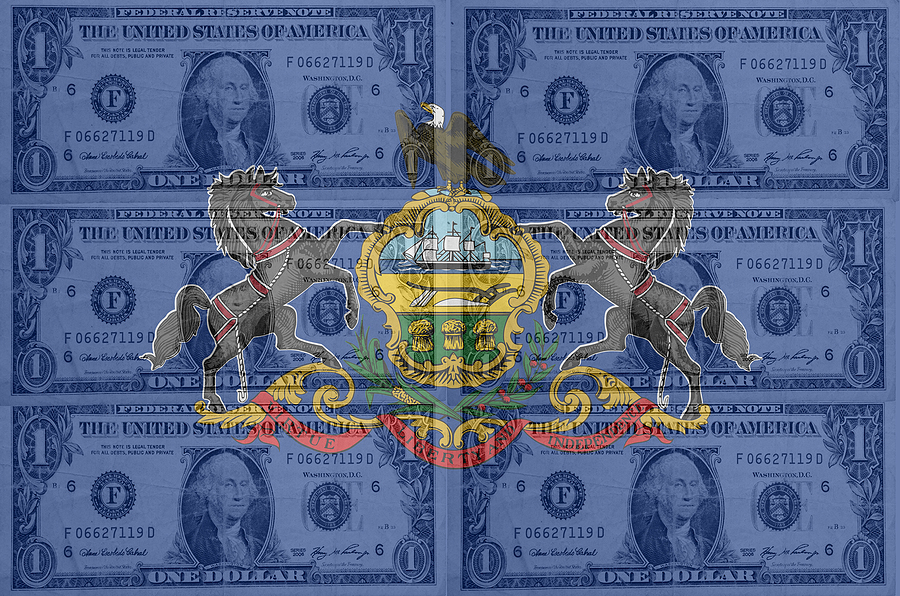Pennsylvanians are “being crushed under a mountain of rising prices,” said Gov. Josh Shapiro in his recent budget address during which he unveiled plans to eliminate the state cell phone tax and expand a senior property tax rebate program.
And just in time, based on a new WalletHub data analysis naming Pennsylvania America’s fourth-highest-taxed state.
In Pennsylvania, residents pay 29.3 percent more in state and local taxes than the average American household, or about $8,820. Roughly 12 percent of Pennsylvanians live in poverty, with the median household income hovering around $68,000, according to the U.S. Census.
According to the data compiled by Wallethub, the average American pays $11,000 in federal income taxes, with taxpayers in higher-taxed states shelling out, on average, about double the amount paid by those living in cheaper states.
The analysis reviewed 50 states and the District of Columbia for four types of taxation—real estate, vehicle, income, and sales tax—and compared them against the national median.
The five lowest-taxed states were Alaska, Delaware, Montana, Nevada, and Wyoming, while Kansas, New York, Connecticut, and Illinois joined Pennsylvania in the top five bracket for tax burdens.
Pennsylvania was also third-highest in gas taxes. The state’s gas tax increased three cents at the beginning of the year, up to 61 cents per gallon. That’s more than every state except California and Illinois, according to the American Petroleum Institute, though the state Senate tried nixing that by passing a bill to undo the automatic bump.
Pennsylvanians ranked among the highest-taxed Americans across the board: 40th in real estate taxes, 49th in income taxes, and 26th in sales taxes. The analysis also found that people in Democrat-controlled states typically paid more in taxes than Republican states – 27.88 versus 24.04.
Norm Richter, a former tax chief executive who now lectures on accounting and law at Babson College, said local taxes aren’t usually part of the calculus for people when deciding on places to live. They tend to relocate for jobs or to be closer to friends and family.
His father was one of the exceptions to the rule – he chose Pennsylvania over Rhode Island, knowing the commonwealth wouldn’t tax his pension.
While retirement income is exempt from state and local taxes, a report from the Independent Fiscal Office lends further credence to WalletHub analysis. The IFO found that Pennsylvanians overall have some of the highest tax burdens in the county.
“Local and state governments must balance tax rate considerations with providing the quality-of-life factors needed to make their communities great places to live,” says G. Jason Jolley, a professor of economic development at Ohio University.
Looking to ease that burden, Shapiro, a Democrat, laid out possible areas for relief when unveiling his proposed $44.4 billion spending plan that looked to extend an olive branch in several ways to overtaxed residents.
The governor’s office estimated the cell phone proposal alone could save Pennsylvanians about $124 million a year.
Another proposal would also reduce staffing shortages in critical nursing, law enforcement, and education positions by providing a $2,500 refundable tax credit to those who earn licenses in those fields, lasting up to three years.
The governor also floated expanding the state’s Property Tax Rent Rebate Program, upping the maximum for seniors to $1,000. The roof of the income cap for renters and homeowners would increase to $45,000 a year under his proposal, enabling 175,000 more residents to qualify.
“I want to tie that cap to increases in the cost of living so that this commonwealth never has to say: ‘Sorry, you’re out of luck,’ because their Social Security payment went up, and we didn’t act,” Shapiro said during his address earlier this month.
The governor’s fiscal wish list must survive hearings and budget negotiations among divided lawmakers. Democrats have a slight majority in the House while Republicans control the Senate, but they must come together to have a spending plan by July 1, the start of the fiscal year.
Please follow DVJournal on social media: Twitter@DVJournal or Facebook.com/DelawareValleyJournal

